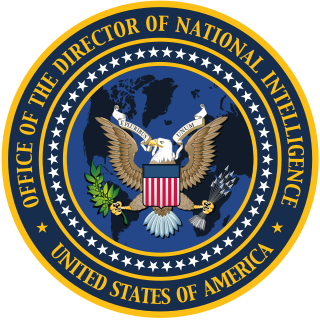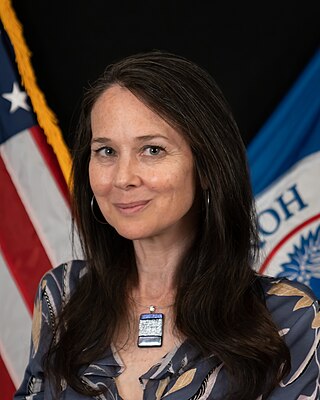
Cybercrime encompasses a wide range of criminal activities that are carried out using digital devices and/or networks. These crimes involve the use of technology to commit fraud, identity theft, data breaches, computer viruses, scams, and expanded upon in other malicious acts. Cybercriminals exploit vulnerabilities in computer systems and networks to gain unauthorized access, steal sensitive information, disrupt services, and cause financial or reputational harm to individuals, organizations, and governments.

The director of national intelligence (DNI) is a senior, cabinet-level United States government official, required by the Intelligence Reform and Terrorism Prevention Act of 2004 to serve as executive head of the United States Intelligence Community (IC) and to direct and oversee the National Intelligence Program (NIP). All IC agencies report directly to the DNI. The DNI also serves, upon invitation, as an advisor to the president of the United States, the National Security Council and the Homeland Security Council on all intelligence matters. The DNI, supported by the Office of the Director of National Intelligence (ODNI), produces the President's Daily Brief (PDB), a classified document including intelligence from all IC agencies, handed each morning to the president of the United States.
Fortinet is a cybersecurity company with headquarters in Sunnyvale, California. The company develops and sells security solutions like firewalls, endpoint security and intrusion detection systems. Fortinet has offices located all over the world.
A cybersecurity regulation comprises directives that safeguard information technology and computer systems with the purpose of forcing companies and organizations to protect their systems and information from cyberattacks like viruses, worms, Trojan horses, phishing, denial of service (DOS) attacks, unauthorized access and control system attacks. There are numerous measures available to prevent cyberattacks.
The National Cybersecurity Center (NCC) was founded in 2016 as a 501(c)(3) nonprofit organization in Colorado Springs, Colorado. It was started from a vision of then Governor John Hickenlooper, in coordination with several people from the University of Colorado Colorado Springs (UCCS) and the community. The NCC serves both public and private organizations and individuals through training, education, and research.
Melissa Hathaway is a leading expert in cyberspace policy and cybersecurity. She served under two U.S. presidential administrations from 2007 to 2009, including more than 8 months at the White House, spearheading the Cyberspace Policy Review for President Barack Obama after leading the Comprehensive National Cybersecurity Initiative (CNCI) for President George W. Bush. She is President of Hathaway Global Strategies LLC, a Senior Fellow and member of the Board of Regents at Potomac Institute for Policy Studies, a Distinguished Fellow at the Centre for International Governance Innovation in Canada, and a non-resident Research Fellow at the Kosciuszko Institute in Poland. She was previously a Senior Adviser at Harvard Kennedy School's Belfer Center.
Cyberwarfare is the use of computer technology to disrupt the activities of a state or organization, especially the deliberate attacking of information systems for strategic or military purposes. As a major developed economy, the United States is highly dependent on the Internet and therefore greatly exposed to cyber attacks. At the same time, the United States has substantial capabilities in both defense and power projection thanks to comparatively advanced technology and a large military budget. Cyber warfare presents a growing threat to physical systems and infrastructures that are linked to the internet. Malicious hacking from domestic or foreign enemies remains a constant threat to the United States. In response to these growing threats, the United States has developed significant cyber capabilities.

The Cyber Intelligence Sharing and Protection Act was a proposed law in the United States which would allow for the sharing of Internet traffic information between the U.S. government and technology and manufacturing companies. The stated aim of the bill is to help the U.S. government investigate cyber threats and ensure the security of networks against cyberattacks.

Palo Alto Networks, Inc. is an American multinational cybersecurity company with headquarters in Santa Clara, California. The core product is a platform that includes advanced firewalls and cloud-based offerings that extend those firewalls to cover other aspects of security. The company serves over 70,000 organizations in over 150 countries, including 85 of the Fortune 100. It is home to the Unit 42 threat research team and hosts the Ignite cybersecurity conference. It is a partner organization of the World Economic Forum.

Lisa Oudens Monaco is an American attorney, former federal prosecutor and national security official who has served as the 39th and current United States Deputy Attorney General since April 21, 2021. She is a member of the Democratic Party.

The Cybersecurity Information Sharing Act is a United States federal law designed to "improve cybersecurity in the United States through enhanced sharing of information about cybersecurity threats, and for other purposes". The law allows the sharing of Internet traffic information between the U.S. government and technology and manufacturing companies. The bill was introduced in the U.S. Senate on July 10, 2014, and passed in the Senate on October 27, 2015. Opponents question CISA's value, believing it will move responsibility from private businesses to the government, thereby increasing vulnerability of personal private information, as well as dispersing personal private information across seven government agencies, including the NSA and local police.
Cozy Bear, classified by the United States federal government as advanced persistent threat APT29, is a Russian hacker group believed to be associated with one or more intelligence agencies of Russia. The Dutch General Intelligence and Security Service (AIVD) deduced from security camera footage that it is led by the Russian Foreign Intelligence Service (SVR), a view shared by the United States. Cybersecurity firm CrowdStrike also previously suggested that it may be associated with either the Russian Federal Security Service (FSB) or SVR. The group has been given various nicknames by other cybersecurity firms, including CozyCar, CozyDuke, Dark Halo, The Dukes, NOBELIUM, Office Monkeys, StellarParticle, UNC2452, and YTTRIUM.
Cyber threat intelligence (CTI) is knowledge, skills and experience-based information concerning the occurrence and assessment of both cyber and physical threats and threat actors that is intended to help mitigate potential attacks and harmful events occurring in cyberspace. Cyber threat intelligence sources include open source intelligence, social media intelligence, human Intelligence, technical intelligence, device log files, forensically acquired data or intelligence from the internet traffic and data derived for the deep and dark web.
The New Jersey Cybersecurity and Communications Integration Cell (NJCCIC), also known as the New Jersey Office of Homeland Security and Preparedness' (NJOHSP) Division of Cybersecurity, is the first American state-level information sharing and analysis organization in the United States that exchanges cyber threat intelligence and conducts incident response for governments, businesses, and citizens in New Jersey. Located at NJ’s Regional Operations and Intelligence Center (ROIC), and acting in a cyber fusion center capacity the NJCCIC is composed of staff from NJOHSP, the NJ Office of Information Technology, and the NJ State Police. The NJCCIC's nomenclature is derived from its federal counterpart, the National Cybersecurity and Communications Integration Center, which encompasses the U.S. Department of Homeland Security's Computer Emergency Readiness Team (US-CERT).

The Protecting Cyber Networks Act is a bill introduced in the 114th Congress by Rep. Devin Nunes (R-CA), chairman of the House Permanent Select Committee on Intelligence. The legislation would allow companies and the government to share information concerning cyber threats. To overcome privacy concerns, the bill expressly forbids companies from sharing information with the National Security Agency (NSA) or Department of Defense (DOD).

The Democratic National Committee cyber attacks took place in 2015 and 2016, in which two groups of Russian computer hackers infiltrated the Democratic National Committee (DNC) computer network, leading to a data breach. Cybersecurity experts, as well as the U.S. government, determined that the cyberespionage was the work of Russian intelligence agencies.

Anne Neuberger is an American national security official who serves as the deputy national security advisor for cyber and emerging technology in the Biden administration. Prior to this role, she served for over a decade at the NSA, as director of cybersecurity, as assistant deputy director of operations, and as the agency's first chief risk officer. She joined the federal government as a White House fellow, working at the Pentagon, and subsequently served as deputy chief management officer of the Navy, before joining NSA. Before entering government service, Neuberger was senior vice president of operations at American Stock Transfer & Trust Company.

Jen Easterly is an American intelligence and former military official who is serving as the director of the Cybersecurity and Infrastructure Security Agency in the Biden administration. She was confirmed by a voice vote in the Senate on July 12, 2021.
Camille Stewart is an American technology and cybersecurity attorney, public speaker, and entrepreneur. She served as the Senior Policy advisor for the U.S. Department of Homeland Security under the Obama administration from 2015 to 2017 under the Barack Obama administration. She also served as the Head of Product Security Strategy Google after serving as the Lead for Security Policy & Election Integrity, Google Play & Android at Google.
Operational collaboration is a cyber resilience framework that leverages public-private partnerships to reduce the risk of cyber threats and the impact of cyberattacks on United States cyberspace. This operational collaboration framework for cyber is similar to the Federal Emergency Management Agency (FEMA)'s National Preparedness System which is used to coordinate responses to natural disasters, terrorism, chemical and biological events in the physical world.










